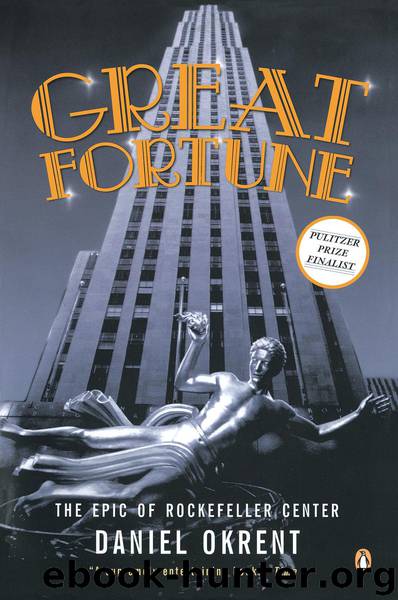Great Fortune: The Epic of Rockefeller Center by Daniel Okrent

Author:Daniel Okrent [Okrent, Daniel]
Language: eng
Format: epub, azw3
Publisher: Penguin Publishing Group
Published: 2004-11-30T04:30:00+00:00
“In real estate circles we were criticized for our ruthlessness,” wrote John R. Todd shortly before his death, in 1945, “which was just another word for good business ability to go out and get tenants.” From the beginning Robertson, Kirkland, and their agents—among them a sizeable contingent of former college football stars*—had been a little sharp of elbow. According to Architectural Forum, competitive brokers found them “uncordial.” An internal Rockefeller Center document warned, “The high powered methods that created success in 1928 create resentment and resistance to-day. . . . Tolerance and generosity must replace the hard-boiled formulas of aggressive competition. . . . Avoid all hard business, or appearance of it. Buy close but do not chisel. We need friends.” The writer of the unsigned memo was not persuasive. At Debevoise’s insistent urging, William A. White & Sons, the firm Junior had first retained in 1929 and that had been handling Rockefeller real estate transactions in New York for decades, had its commissions cut off. On one page of a lengthy letter Todd sent Junior late in 1933, detailing progress and difficulties relating to every aspect of the development, one of the very few comments Junior inserted in the margins came at that point where Todd noted a savings of more than $800,000 derived from working “without outside brokers and the attendant brokers’ commissions.” Considering the difficulty of renting all that space, someone else might have found this a foolish economy. Junior did not. In his tiny, careful hand, just above Todd’s comment, he wrote one word: “good.”
There was no impropriety in working around the city’s established real estate brokers; if anything, their you-scratch-my-back-I’ll-scratch-yours way of doing business could use a jog or two. But the stratagems that placed the headline “ROCKEFELLER GROUP SUED FOR $10,000,000” on the front page of the Times, with all those unpleasant characterizations trailing below it, were far rougher and had more meaningful repercussions. And though Junior did not conceive these tactics, it wasn’t an accident that they evoked the unpleasant aroma that scented the Rockefeller name before Junior scrubbed it clean: this was a way of doing business right out of Senior’s Standard Oil hymnal, utterly legal, utterly deadly to the competition, and, enhanced by large quantities of cash, utterly irresistible to those who could make it succeed. In a word, Robertson was paying businesses to skip out on their existing leases and decamp to Rockefeller Center.
The man who brought the lawsuit against Junior, Todd, Robertson, Winthrop Aldrich, Nelson Rockefeller, and virtually anyone else whose name would fit onto the first page of the court papers was, according to a contemporary characterization, one of “The 100 Men Who Make New York What It Is Today.” August Heckscher had arrived in the United States shortly after the Civil War, a nineteen-year-old émigré from Germany. He made his fortune mining zinc, and thereupon transformed it into gold by exposing it to the alchemical properties of the Manhattan real estate market. He was an incongruous sort,
Download
Great Fortune: The Epic of Rockefeller Center by Daniel Okrent.azw3
This site does not store any files on its server. We only index and link to content provided by other sites. Please contact the content providers to delete copyright contents if any and email us, we'll remove relevant links or contents immediately.
| Africa | Americas |
| Arctic & Antarctica | Asia |
| Australia & Oceania | Europe |
| Middle East | Russia |
| United States | World |
| Ancient Civilizations | Military |
| Historical Study & Educational Resources |
Cat's cradle by Kurt Vonnegut(14119)
Pimp by Iceberg Slim(13146)
Underground: A Human History of the Worlds Beneath Our Feet by Will Hunt(11404)
4 3 2 1: A Novel by Paul Auster(11246)
The Radium Girls by Kate Moore(11074)
American History Stories, Volume III (Yesterday's Classics) by Pratt Mara L(4887)
Wiseguy by Nicholas Pileggi(4783)
Perfect Rhythm by Jae(4732)
The Fire Next Time by James Baldwin(4511)
Paper Towns by Green John(4315)
Pale Blue Dot by Carl Sagan(4162)
A Higher Loyalty: Truth, Lies, and Leadership by James Comey(4157)
The Mayflower and the Pilgrims' New World by Nathaniel Philbrick(3992)
The Doomsday Machine by Daniel Ellsberg(3880)
Too Much and Not the Mood by Durga Chew-Bose(3795)
Killers of the Flower Moon: The Osage Murders and the Birth of the FBI by David Grann(3779)
The Borden Murders by Sarah Miller(3701)
The Sympathizer by Viet Thanh Nguyen(3673)
Killing England by Bill O'Reilly(3558)
